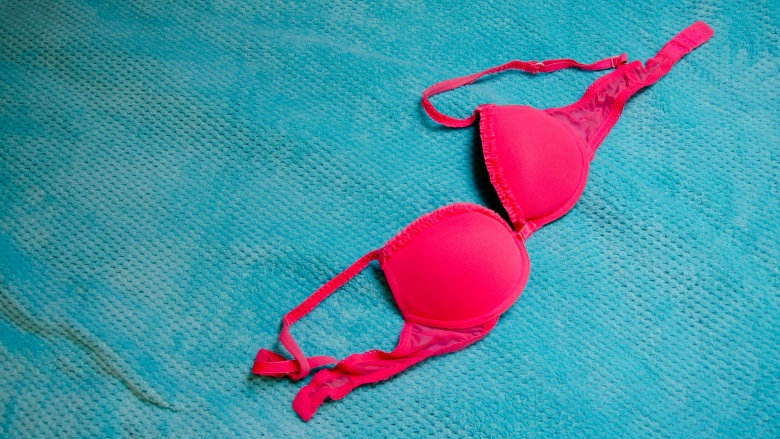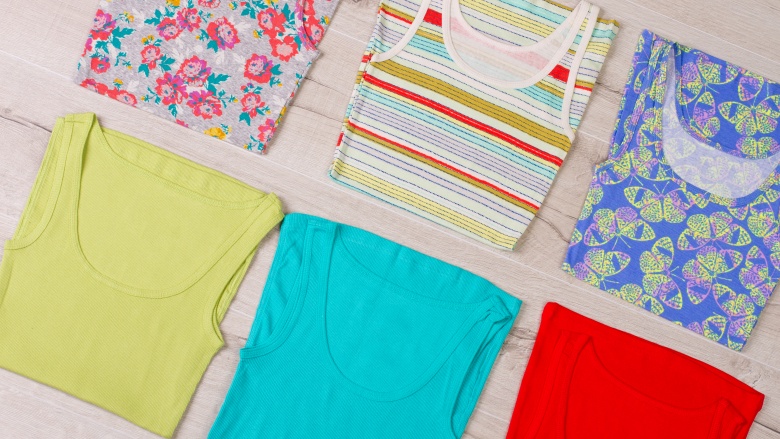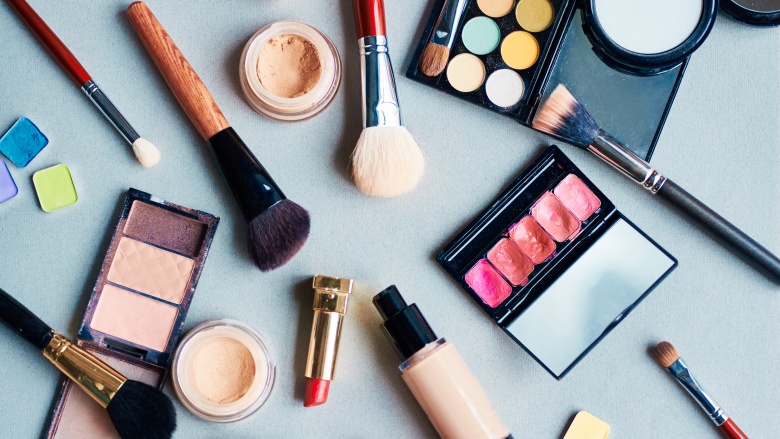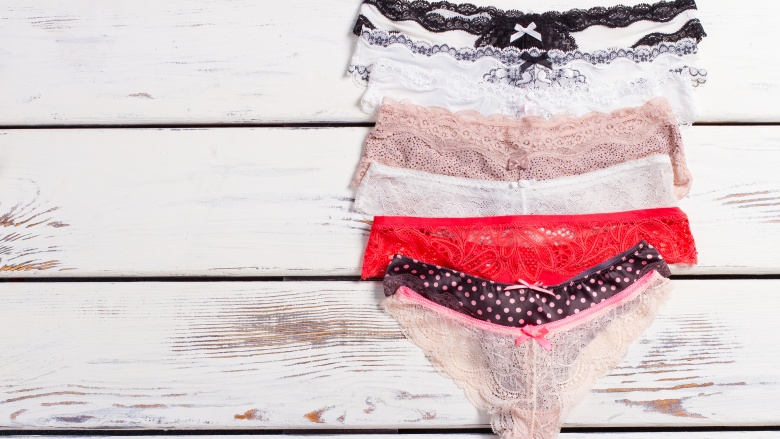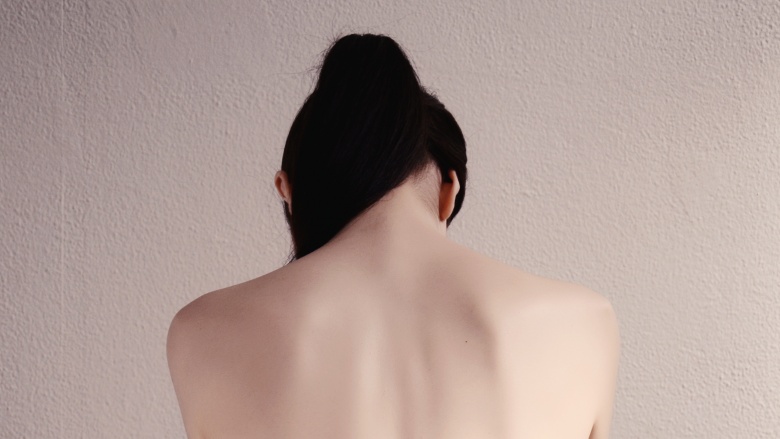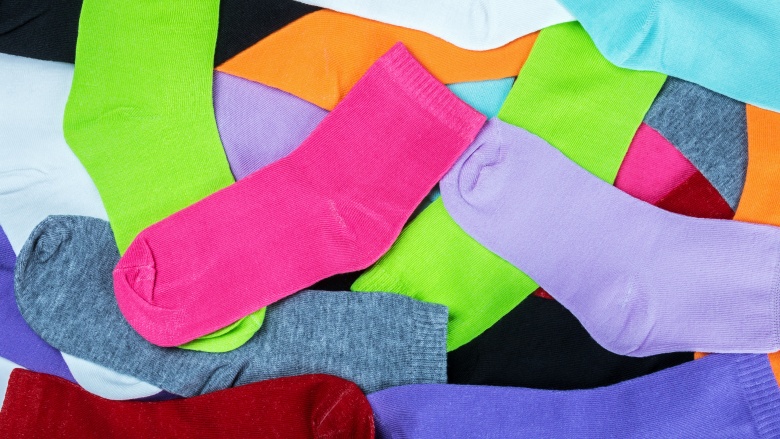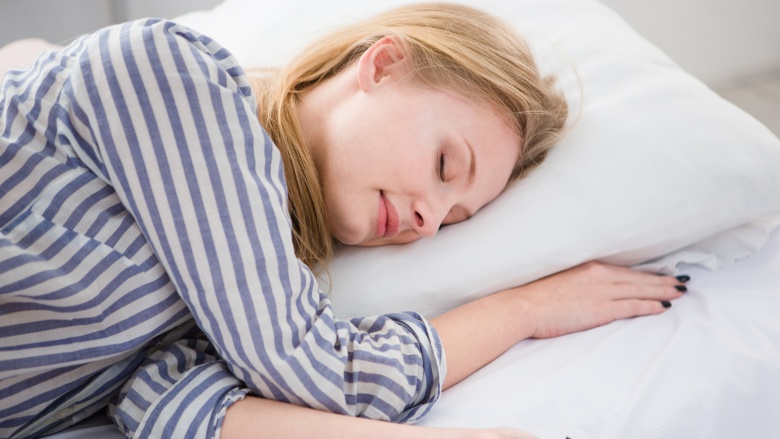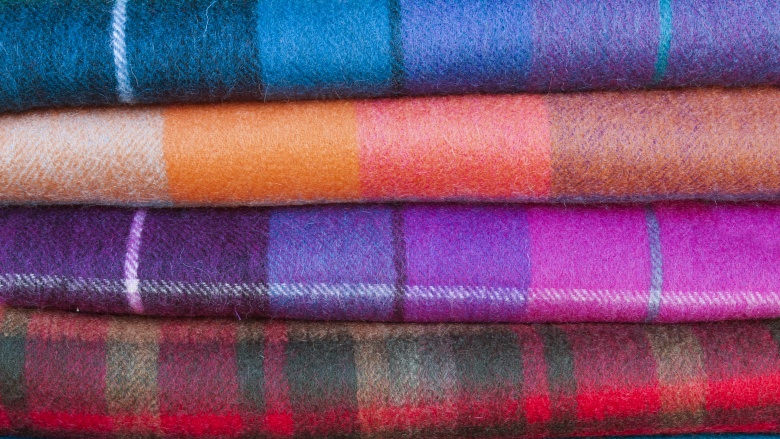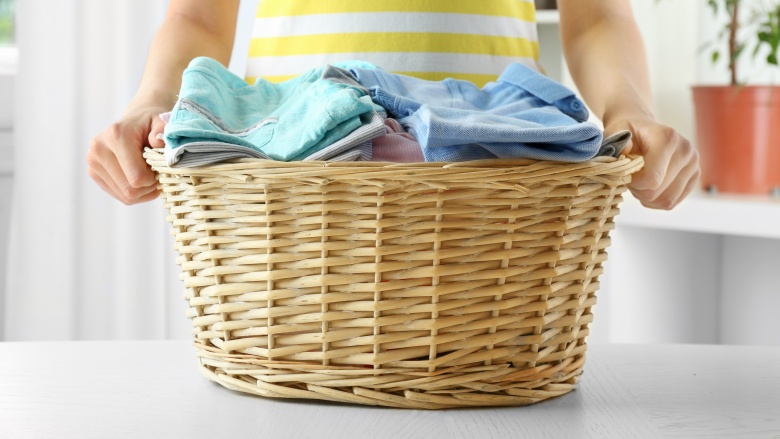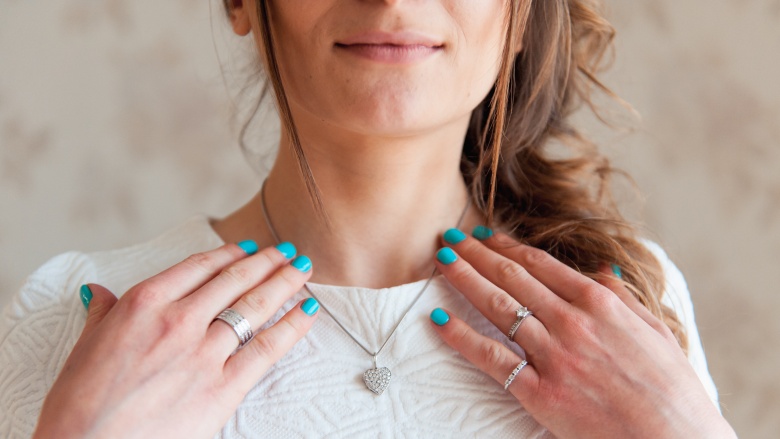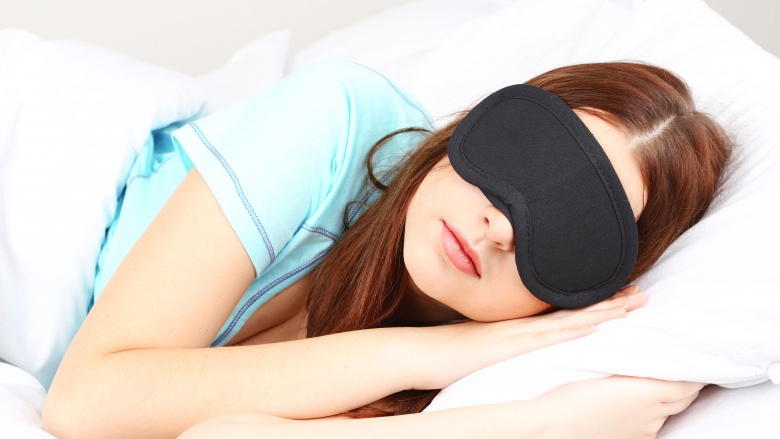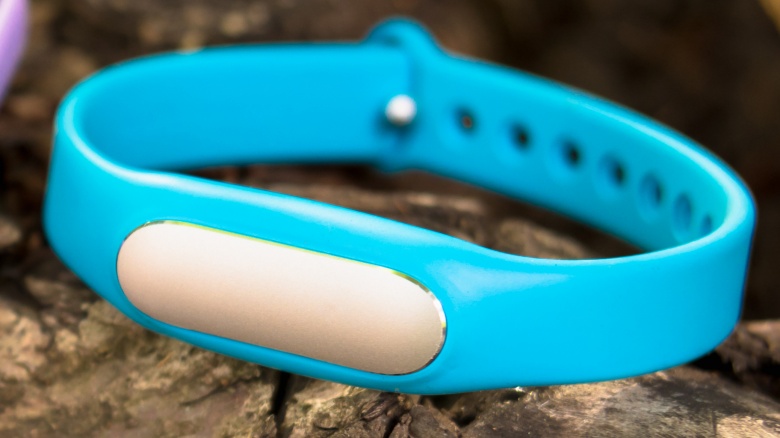What You Should And Shouldn't Wear To Bed
Getting enough sleep is an important part of maintaining a healthy lifestyle. In fact, being sleep-deprived can lead to a wide range of medical problems, including stroke, high blood pressure, type 2 diabetes, depression, weight gain, and even a heart attack. Since sleep is so intrinsically linked to your physical and emotional health, it's never been more important to wear the right kind of attire to bed each night. But how do you know if your bedtime clothing choices are truly helping your body or actually causing one big nightmare? Are you putting yourself at risk of developing serious health problems the moment you put on your pajamas? It's time to find out.
Ditch the bra
Many women choose to wear a bra to bed each night. In fact, there's a widespread misconception that sleeping in a bra can help prevent sagging in the future. However, when you choose to go to sleep with your bra on, you're really making yourself vulnerable to numerous health issues. In the first place, bras can be quite constricting, and if you're wearing a bra that fits tightly against your skin, you're actually hindering the circulation in your body. Further, bras can also squeeze and tighten the area around your diaphragm and put unnecessary pressure on your chest, which can make it more difficult for you to breathe throughout the night. In addition, your bra's underwire, straps, and hooks have the potential to dig deeply into your skin, which can lead to indentations, irritations, welts, and even cysts. And if that's not distressing enough, wearing a bra to bed is also increasing your likelihood of developing a fungal infection, especially if your bedroom is on the warmer side or if you live in a humid climate. And when it comes to the quality of your sleep itself, wearing a bra to bed has also been linked to sleeplessness, as it can hamper your ability to achieve a truly deep sleep state.
Keep it loose
There are many different kinds of form-fitting and form-flattering clothing that women like to wear to bed each night. Whether it's a tight tank top, a pair of booty shorts, or a sexy spandex negligee, many women head for bed sporting very tight, taut, and clingy attire. And while you (and quite possibly your partner) may enjoy the look and feel of these items, you're actually engaging in a different kind of risky bedroom behavior every time you wear them. In fact, your skin-tight nighties are posing a risk to your overall health. First, when you wear constricting clothing to bed, such as pants with an elastic waistband or a binding type of shirt, you're negatively impacting your circulation as well as hampering your ability to breathe normally throughout the night. And speaking of breathing, it's your skin that also needs to breathe, and wearing taut and tight items each night can lead to skin irritations and even infections. But if that's not enough to sweat over, wearing binding clothing also has been linked to inhibiting the development of melatonin, which is a key hormone that helps to regulate your sleep cycles. And when your body's natural circadian rhythm is off, the prospect of getting a good night's sleep is off as well. From now on, it's important to remember that your desire to "sleep tight" is just not right.
Remove your makeup
Every woman needs her beauty rest, but wearing makeup to bed is not the way to achieve it. In reality, sleeping with your makeup on actually hinders your goal, as many unattractive and unappealing outcomes can result from this major makeup mistake. When you leave your makeup on all night, the dirt and oil buildup on your face doesn't get washed off, and when your pores are blocked, this is likely to lead to pimples. Further, for women who are already prone to pimples, this can exacerbate the situation even more. Plus, since many makeup products contain ingredients that are far from natural, keeping makeup on your skin all night puts you at a greater risk of developing rashes, irritations, and allergic reactions. In terms of your eye makeup, you may have already experienced nights when dried-up mascara and remaining specs of eye shadow make their way into your eyes, and in many cases this can wake you up and prevent you from getting a solid night's sleep. So if you're looking to keep your face young and fresh, it's time to face the reality that wearing makeup to bed isn't a smart choice. Instead, head to your local drugstore or makeup retailer to find the right gentle facial cleanser and makeup remover. In fact, when you wash your face before bed, you're keeping your skin hydrated and even helping to prevent the appearance of premature aging, namely in the form of wrinkles and dryness. No matter how exhausted you may be, there's no excuse to not take off your makeup before you tuck yourself into bed.
Go without underwear
Wearing underwear to bed is a common nighttime practice for many women. In fact, the mere thought of going to bed without underwear may make you a little uncomfortable. However, before you put the kibosh on going to bed "commando," it's important to understand why sleeping in underwear can be unfavorable to your health. On the one hand, covering up your vaginal region during the night can actually create the perfect kind of moist, dark, and warm breeding ground for bacteria. And if you're a woman who has a proclivity for vaginal and yeast infections, sleeping with underwear is practically laying the groundwork to develop these kinds of undesirable medical outcomes, especially if you're a bedtime thong-wearer. Further, an additional perk of sleeping without underwear is that it reduces the possibility of developing other vaginal irritations and inflammation. Plus, many women who go without underwear appreciate the sheer ease and simplicity of sleeping without it, especially since it also can help to increase the intimacy levels between you and your partner. Having less laundry and more closeness is not a bad trade-off.
Dare to go bare
Depending upon your personal nighttime preferences, if you're really looking to be bold at bedtime while simultaneously taking your sleep to the next level, heading to bed completely nude is also a great option. In addition to the many health benefits of sleeping in the buff, such as reducing the likelihood of developing certain skin and vaginal infections and irritations, preventing the possibility of clingy pajamas suppressing the production of melatonin, as well as increasing the intimacy and closeness between you and your partner, there are many more advantages than meet the naked eye. First, going to bed without clothes can help to lower your body's temperature, which has been shown to improve the quality and quantity of your sleep and can aid in reducing sleep disturbances throughout the night. Further, research has also indicated that having a lower body temperature at bedtime can help promote positive metabolic changes in your body and has even been linked to improving your sensitivity to insulin. However, in case of a nighttime emergency, it's always a good idea to have some clothes near your bed that you can quickly put on if need be. Sleeping in the nude is one thing, but having to run out onto the street completely naked during an urgent situation is another.
Stick with socks
If going without any apparel is not appealing to you, there are other nighttime clothing choices that can benefit your sleep. If you prefer to stay covered up when you're under the covers, one easy and rewarding option is to opt for socks. In fact, when you warm up your feet by wearing socks when you get into bed, you're actually lowering your blood pressure and preparing your body for sleep. Research has even shown that warmed up feet can help you fall asleep faster. But if that advantage didn't convince you, socks also help to keep your feet looking and feeling young and beautiful by aiding in the prevention of cracks and dryness. Plus, if you have feet that tend to be on the sweatier side, socks can help to absorb some of this moisture. So whether you prefer argyle, patterned, plaid, or plain, finding socks that fit your body and your personality is a fitting addition to your nighttime routine.
Pick cotton pajamas
If sleeping in the buff is something you'd rather rebuff, finding the right sleepwear has never been so important. With this in mind, cotton pajamas are a top pick. In the first place, cotton is a natural fiber that's extremely soft, comfy, and lightweight, making it an ideal choice for a good night's sleep. Further, cotton also enables your skin to breathe and is less likely to cause rashes or irritations, particularly if your cotton jammies are loose-fitting. However, depending upon your personal nighttime preferences and tendencies, it's also important to keep in mind some of cotton's possible nighttime disadvantages. For instance, if you're someone who typically gets cold throughout the night or if you're sleeping in a cooler environment, cotton isn't the best insulator, and you may feel a bit chilly, which can negatively impact your sleep. On the flip side, if you're a person who is likely to sweat throughout the night, other fabrics can be more absorbent. However, even with these factors in mind, most people find that cotton is a great pajama option.
If not cotton, find the right fabric for you
If wearing cotton jammies or wearing nothing at all doesn't align with your pajama personality, there are other options that can be beneficial to your health and still help you achieve a good night's sleep. For example, if you're looking to wear something more on the sexy, sultry, and ultra-luxurious side, silk pajamas are a clear choice. Some benefits of silk include helping to regulate your body's temperature throughout the night as well as being smooth and soft against your skin. However, if you're interested in a different nighttime look and feel, bamboo fabric pajamas may be just what you need to sleep well. In fact, bamboo is more absorbent than cotton, soft to the touch, and is even hypoallergenic. And if that's not intriguing enough, research has shown that bamboo fabric contains anti-microbial properties. With this in mind, it's no wonder that there are many different bamboo fabric products on the market today, including pajamas, sheets, and pillows. But if bamboo doesn't do it for you, opting for the classic flannel fabric pajamas can be a warm and cozy option, especially during the fall and winter. It's truly up to you to decide what fabric you'd like to weave into your nightly routine.
Keep it clean
How often do you wash your pajamas? Since many women prefer to sleep in the same pair of pjs night after night, they may not realize that they're really sleeping in dirty clothing over and over again. When you don't wash your clothes enough, you're actually wearing down your health in a variety of ways. Because the millions of skin cells as well as an approximate quart of body sweat humans lose each day, you're upping your chances of developing bacterial infections when you don't go down to the laundry room to wash your pajamas frequently enough. Plus, if you're someone who tends to eat in your pajamas, just think about all of the food particles making their way onto your PJs every single day. Because of this, it's recommended that you wash your pajamas after wearing them three to four times. But if that's not doable, it's worth investing in multiple pairs of your favorite jammies.
Just say no to jewelry
Do you regularly go to bed wearing your favorite pair of earrings? Do always leave on your wedding ring, no matter what the circumstance, even when you sleep? You may never want to remove these special and significant items, but sleeping in your jewelry isn't a great idea. In fact, you're making yourself vulnerable to a wide array of health issues each time you get under the covers covered in jewels. One concern is that the longer you keep your jewelry on, the more you're exposing yourself to developing various skin irritations or allergic reactions from the jewelry's materials. And that's especially true if you're already sensitive to certain metals, such as nickel. There are also times when you may unknowingly scratch or smash yourself with your jewelry while you're asleep and wake up with less-than-flattering jewelry indentation marks on your body. Your jewelry can also get tangled in your hair or caught on your bedding, potentially causing serious circulation problems and even choking. And on a less nightmarish note, sleeping in jewelry also increases the probability of snagging your sheets and pillowcases, as well as raises the likelihood of losing your jewelry in bed, especially stud earrings, which can be harder to locate than a diamond in the rough. Even though you may love to bedazzle yourself, it's important to remove these precious items before bedtime.
Help your hair
While it may seem unusual to put something on your head when you get into bed, wearing a silk scarf or a sleep cap to cap off your bedtime routine can actually help you achieve the dream hair you've always wanted. In fact, covering your hair while you sleep has numerous benefits, including minimizing the likelihood of frizz and hair breakage that can be caused by your hair rubbing against your pillowcase while you sleep. To that end, it's especially important if you have long hair or are looking to grow your hair out, since guarding your hair from unnecessary damage and reducing the likelihood of developing split ends is key. In addition, wearing a silk scarf or a sleep cap can help your hair stay smooth and silky while also eliminating the dryness that can be caused by exposure to the night air. Further, covering your hair while you sleep can even help it to retain body and texture while also cutting down on tangles.
Keep your ears and eyes covered
There are various external factors that can hinder your ability to sleep, such as excessive noise or a bright bedroom. It's likely that you've faced these kinds of circumstances before, perhaps even on a nightly basis. Whether it's a snoring partner, a noisy neighbor, or less-than-helpful blinds, there are certain conditions out of your control that are hurting your ability to fall asleep each night. But the good news is that you have the power to combat these nighttime challenges simply by wearing earplugs and a sleep mask to bed. In fact, research has shown that sleeping in earplugs and a sleep mask can lead to the production of higher levels of melatonin, less sleep disturbances, and more time spent in a deep sleep. So while you may find it strange to keep your ears and eyes covered, these basic items have eliminate those nighttime annoyances that are making it difficult for you to get the sleep you need.
Use a sleep tracker
Have you ever wondered about the quality and quantity of your sleep? Thanks to today's technological advances, you don't have to wonder any longer. There are numerous wearable sleep trackers on the market that can help you learn about your individual sleep patterns as well as understand your body's specific sleeping behaviors and tendencies on an entirely new level. While some wearable trackers simply note the exact duration of your sleep, others give you information regarding your heart and breathing rate, your body temperature, and any nightly movements or disturbances you may have. Further, some sleep trackers can provide you with personalized insight into your body's circadian rhythm and REM cycles, while others even include their very own alarm clocks. In terms of individualized comfort, certain sleep trackers go around your wrist, others attach to your pajamas, and some can even be placed under your mattress. With this knowledge, you'll be better equipped to improve your nightly sleep.


